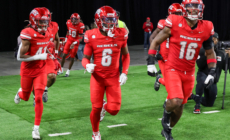-
Suspect in Insurance C.E.O.’s Murder Is Said to Face Federal Charges - 14 mins ago
-
Mets To Sign Right-Hander Griffin Canning: Report - 22 mins ago
-
California earthquake warning app now available on more devices - 34 mins ago
-
Musk Is ‘President-Elect’ After He Helped Tank Spending Plan: David Axelrod - 56 mins ago
-
F.B.I. Searches Home of L.A. Deputy Mayor Suspected of Bomb Threat Against City Hall - 58 mins ago
-
County will pay $7.5 million settlement to girls sexually abused by sheriff’s deputy - about 1 hour ago
-
Falcons QB Michael Penix Jr. Shares Hilarious Place He Heard Starter News - 2 hours ago
-
The Rev. James Callan, Renegade Catholic Priest, Dies at 77 - 2 hours ago
-
More L.A. cats appear to be infected with H5N1 bird flu - 2 hours ago
-
How to Watch Cal vs UNLV, Live Stream LA Bowl, TV Channel - 2 hours ago
Sharon Horgan’s Uncertain Yet Brilliant Path to Apple TV+’s ‘Bad Sisters’

Joe Maher/Getty
“I feel really grateful and jazzed that I got to tell that story and to make this mad hybrid of a show.”
Sharon Horgan has a resume packed with award-winning comedy, but when it came to crafting Bad Sisters (Apple TV+, November 13) she had to find the right balance. That’s because “a very difficult subject matter,” about Irish sisters who plot to murder the abusive husband of one of the women, had to “sit alongside quite a farce.” Adapted from a Belgian series, Horgan took “some of the murders out, and I put more of the sisters in, and more of the effects watching your family member go through this.” “I think you can take chances in the script with where you choose to have a laugh or to release the pressure, or just have something really sort of out-and-out stupid.” Now in its second season, even though that husband is out of the way, after the Peabody Award-winning and Emmy-nominated first season, that doesn’t mean things have gotten easier for the sisters. “Life just doesn’t become hunky-dory, you’ve got this poison you’re still carrying it around.” For Horgan, she’s particularly proud that she was able to find that delicate balance of tone.
SUBSCRIBE TO THE PARTING SHOT WITH H. ALAN SCOTT
ON APPLE PODCASTS OR SPOTIFY
Editor’s Note: This conversation has been edited and condensed for publication.
How thrilled were you by the reaction to the first season?
Oh, my God. We worked really hard on it. I felt there was a lot going for it, but you just don’t know. My background is half-hour sitcom and this was a totally, a whole different thing. A very difficult subject matter that had to sit alongside quite a farce girl kind of premise. I didn’t know who I was going to offend. People might be like, “What the f*** is this?” But they didn’t. They had this incredible reaction. And I feel like it was down to the show and the feeling of getting to hate on a really great villain. But also, I feel like it was the time, there was something about that time where everyone needed to sublimate their anger or they just were being influenced by the atmosphere, which was basically right wing, sort of religious men telling women what to do. And so it felt like the time that it came along as well helped. But I was absolutely thrilled.

Apple TV+
You won a Peabody! That’s insane. This is an adaptation from a Belgian series, so how did you make the idea your own?
I think from the moment I watched the pilot of the Belgian series, I felt like I knew how to make it my own. Well, I think, first of all, it was just setting it in Ireland and taking ownership of it that way. But also, I come from a large family, and so I felt really connected to the sisters. But what I felt that the original didn’t have—and there was a lot of great things about it, I’ll always and forever be grateful that I was allowed to adapt it—but I felt that the the farce of trying to kill this man kind of got in the way of the real collateral damage that would happen to a group of sisters who protected each other and cared and loved about each other so much. I didn’t believe that these terrible things could happen and it wouldn’t impact them personally and in their relationships to each other. And so I just felt like, if I take some of the murders out, and I put more of the sisters in, and more of the effects of watching your family member go through this, and the effect of all the the terrible mistakes that have happened along the way—because they are just normal women who are not experts at murdering. So these terrible things kept happening. But I really wanted to feel it, and so I feel like my background in talking about relationships and family and stuff, I knew I could rely on that. And then I guess just the fresh eyes of it, coming to a thriller and the hour, I knew I would be approaching it in a way that felt a little bit left field of maybe what might be expected.
There is sort of a British small-town mystery of it that makes it even more delicious.
For sure. A lot of the places that we ended up shooting in are places that I spent my childhood. With John Paul, in the original he was an outsider because he was an outsider within that family. He could never crack it. And that was what messed with him, because he’s a narcissist and a sociopath. But in our one, we cast Claes Bang, he’s Scandinavian and Swedish, and so he’s an he’s an outsider on the island as well, the island of Ireland. And the smaller we made it, I felt that the harder it would feel for someone who regarded himself so much and was such an imposing character, feeling ignored was huge, because in Ireland, everyone knows each other. They’re really like, often small little bungalows right on top of each other. And it’s tight and it’s close and those sort of areas from my childhood that felt even smaller now. So it was collecting places and creating this map of where these sisters lived, and putting all my favorite things in it, like with the Forty Foot, which is this very famous spot in Ireland that people have been going to swim for years. But I felt like, outside of Ireland, no one would have heard of it. And so when I was doing the recce for where we’re going to shoot, and I went along there, I had in my mind that I wanted to get it on screen. But then there came a point where I was watching these women in the water, this group of women in their ’60s. And by the way, I can’t tell you how cold they were in there. I mean, you literally get in, you get out.

Apple TV+
That’s so British to me.
Well, the Irish are mad for it, and they were just in the water, just treading, chatting. And I just thought, “Well, this is where the sisters could plot the murders.” It was so weirdly private. And so, all you can hear is the elements and the waves crashing against the rocks. And I just thought, “Well, that’s what I want to see the sisters do. I want that to be a huge part of their connection and their tradition.” And it all sort of helped. It helped with the atmosphere, and it helped with the villainy of John Paul, and it helped with the closeness of the sisters. It was like a proper gift, getting to film it there.
What can we expect from this next season?
I hope when people watch it, they’ll go, “Oh, right. Of course. This is the route it took.” I feel really grateful and jazzed that I got to tell that story and to make this mad hybrid of a show. But I think what happens in the second season I’m even more connected to because it’s the fallout, it’s checking in with these sisters two years down the line and everything you would wonder about how they got their lives back on track, and how they move forward, and how it affected their family. And Grace, for [a] good person, the guilt that she would carry around and all of that I felt, I wanted to see. And then there’s a whole other element to it that I can’t really tell you about, because everything I tell you is just going to give the story away, but the ghost of John Paul has cast a shadow across them and choices he made, because everything’s down from him and his behavior, and so the choices he made impacts them in the second season. I just wanted to get under the skin of women who’ve been through that and the aftermath. Life just doesn’t become hunky-dory, you’ve got this poison, you’re still carrying it around.
How do you balance the drama with the levity, particularly because the themes of the show are so serious?
Yes, it is. It is actually, and I think for the most part—apart from dealing with the weather in Ireland—it’s the hardest bit, because you have to keep a check on it throughout. You have to keep a check on it at the script stage, of course, and the storylining, but in the casting of it and in the filming of it, and then right down to the to the edit. I think you can take chances in the script with where you choose to have a laugh or to release the pressure, or just have something really sort of out-and-out stupid. I think all that can go in there. But I think when it comes down to the edit, that’s when you have to make a lot of choices of what stays and what goes and really, I think the cast were so committed and connected to it that they were keeping an eye on the tone of their own performance. But I never really felt nervous because they’re all the kind of actors who can turn on a dime. Just because there’s a moment of levity doesn’t mean they can’t switch to the darker moment, and you don’t utterly believe them. I think when you’re dealing with actors who have the sort of skills to do that, it makes it a bit less scary. I would hate for a second for anyone to think that I was making light of it or not taking that subject matter seriously. But at the same time, you know, I feel like when you deal with something like that with humor, like you do in life—any of my darkest moments have been followed by some sort of gallows humor—I think, if you’re honest, it’s about just grounding in truth always so never having a moment that doesn’t feel like it’s earned. And then I actually think people lean in more when it affects them more because you’ve just been laughing, and suddenly this horror happens. And so it’s much more visceral. And so in actual fact it really lends well to drama, to not just [to] be pitch black, to not be void of humor.

Apple TV+
You do so many different aspects of the show, from writing to production to acting. What process do you enjoy the most?
Oh, it’s always the writing. It’s the writers room bit, or even me on my own or me with my producer. It’s that stage where it’s all up for grabs, where everything is possible, where you can have a crazy idea like Shining Vale and you haven’t gotten even through the pitch stage, where it’s just like the possibilities are endless. Writing is definitely the hardest bit, but when it’s going well, everything’s for the taking, you know? And you can be as creative as you want, and then eventually someone’s going to tell you no. I still love acting for sure, but I probably find it the least enjoyable. I love the camaraderie of it. I love creating a team, a sort of family, where you’re all looking out for each other and and you’re playing together. I do love that, because the writing bit can get a bit lonely. But in a really practical way, just the whole getting up at five, sitting in a makeup chair, being on set all day, it’s very sort of anti-family kind of practice. Being away and all that. And then the producing side of things, all of that is great, but I kind of like it when someone else takes over and does the tricky stuff and sends me reminder emails constantly.
When you’re involved so heavily in the creation of a character, does that change how you approach acting that character out?
It does really, negatively and positively, because oftentimes your performance is the last thing you’re thinking about. Your character is in your head from the off, but so is everyone else’s. So it’s very hard to drop that. The most helpful thing that Dearbhla Walsh—she’s our main series director—would say to me was just, “I can see you thinking about everything else apart from what you’re doing. F****** stop. Just be in the moment.” If I’m showrunning something, it’s very hard for me to not think about everything else. But I kind of hope that a lot of the head work of the character is done in that early writing stage, I hope the roots are kind of there.
To read how Newsweek uses AI as a newsroom tool, Click here.
Source link

















